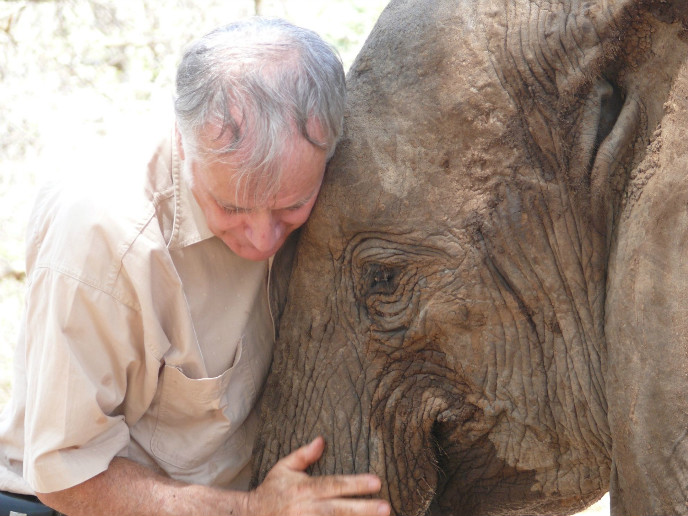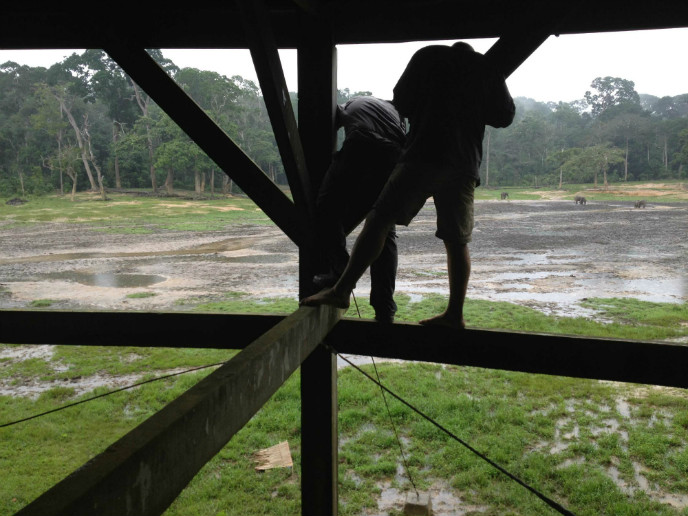
On one side are the bad guys: poachers who slaughter elephants for their ivory, capture African Grey parrots and other prized animals, and strip forests bare. On the other side are the good guys: park rangers who risk their lives to protect Africa’s endangered animals and natural resources.
Hoping to tip the scales in this fierce war are people like Nir Kalron, a 36-year-old Israeli working to strengthen the continent’s environmental security.
In vast expanses of misty jungle and arid savannah, Kalron’s Maisha Consulting conducts anti-poaching and anti-trafficking intelligence and investigations, installs security technology, and trains rangers to more effectively clamp down on criminal activity.

In cooperation with African governments and NGOs such as the Wildlife Conservation Society and World Wildlife Fund, Maisha’s seven-person team teaches the rangers intelligence analysis and data management; operational discipline; weapons and tactics; aviation; first aid; dog handling; sea rescue; Krav Maga hand-to-hand combat; arresting suspects and stopping vehicles.

“The threats are different in each country,” Kalron tells ISRAEL21c, “so you have to modify your training to the specific needs. The essence of our training is making a connection to the rangers on the ground. We know every one of them and keep in contact. We’ve even lost some of them, killed in action.”
The danger to law enforcers has increased in the past three or four years along with the price of ivory and other precious materials on the black market.
Devastating loss
Working for illicit traffickers, African poachers slaughter at least 35,000 African elephants each year. They kill rhinos for their horns; tigers, leopards and pangolins for their skin; and trap exotic parrots and great apes to be smuggled to buyers. Poachers also engage in illegal logging, decimating natural habitats and literally clearing a path for poachers.
“If you cut into the earth and deplete its natural resources, then we’re screwed. It’s not like drug trafficking, which has been going on for decades and is status quo,” says Kalron. “On the environment side, if the situation continues there is no status quo. There is permanent loss.”
However, more money goes toward conservation projects than countering environmental crime. “There won’t be anything to conserve without harsh measures in security and enforcement against wildlife trafficking as there are in drug trafficking,” Kalron warns.
Though Maisha is the only private Israeli company devoted to environmental security, over the years Israeli involvement in anti-poaching initiatives has included, for example, a wildlife forensics lab set up in Kenya by the Israel Nature and Parks Authority (INPA) to analyze evidence for court cases against poachers; and a donation of high-frequency radios to rangers in Senegal National Parks by Motorola in Tel Aviv.
Mission to Kenya
American-Israeli conservationist Bill Clark, 71, has long worked with the Kenya Wildlife Service (KWS) and the Convention on International Trade in Endangered Species of Wild Fauna and Flora (CITES).
In 1989, Clark succeeded in getting elephants added to the CITES treaty following a decades-long effort, thereby illegalizing international trade in contraband ivory.
“That was the most important achievement of my entire life,” he tells ISRAEL21c from his home near Washington, DC, where he’s worked for Interpol since his retirement from INPA in 2010.
Clark spearheaded many innovative projects to help KWS rangers protect wildlife and their own lives, often working with Maisha Consulting in recent years.
Noting that 62 of some 4,000 rangers have died in the line of duty, mainly from gunshot wounds at the hands of poachers, he and Kalron arranged first-aid classes in Kenya and took a dozen of the rangers to Israel for advanced training by Magen David Adom. “Now they’re back in Kenya and the best ones are getting certified as first-aid instructors,” says Clark, who served in the US Marine Corps and the Israel Defense Forces (IDF).
In 1994, Clark went with Kalron’s father, a former IDF pilot, to train Kenyan surveillance pilots using refurbished surplus IDF Piper planes. Nir Kalron, then a teenager, was keenly interested in their work and remained in touch with Clark.
“After my military service, 12 years after my father trained the pilots with him, I went on my first mission with Bill,” Kalron relates.
This was a volunteer mission to Kenya on behalf of Interpol’s Working Group on Wildlife Crime, which Clark headed at the time. They brought night-vision equipment donated by INPA, and showed rangers how to use it. Kalron was intrigued by the problem of ivory poaching and decided to learn more about all the environmental issues affecting Africa.
Reclaiming wildlife reserves
Clark explains that most poaching is done at nighttime to evade the park rangers and aerial patrols. Even with night-vision equipment, rangers are at great risk in the dark, and this is when bullets are most likely to start flying.
Kalron is coordinating an effort to bring the KWS Israeli-trained dogs. Canines see well in the dark and could stop a poacher in his tracks without shooting him. Interrogating a live prisoner can more easily yield information on “the real criminals, the traffickers who are paying them $300 per kilo of poached ivory,” says Clark.
Soon, Kalron is heading to the northern Democratic Republic of Congo (DRC) to help an American NGO assess what is needed to reestablish a protected wildlife area scarred by recent armed conflict. Previously, Maisha was instrumental in efforts to secure the Dzanga-bai (Village of Elephants) in the Central African Republic, part of a vast UNESCO World Heritage Site.
“There are all these amazing protected areas in volatile parts of Africa where people can buy an AK47 for $50 and create terrorist groups,” says Kalron. “When the land is reclaimed by the government, the NGOs bring the money and the management, and we bring the expertise. Then we slowly bring in rangers, because you can’t rehabilitate a 14,000-square-kilometer park overnight.”
Environmental crime is rampant in Africa, yet Kalron is optimistic that one day it will improve enough for Maisha to get out of the business. “Maybe afterward we’ll go into countering human trafficking,” he muses. “We don’t want to just sell knowledge. We are a for-profit with a social calling.”
On April 1, the Smithsonian Air & Space Museum in Washington will open an exhibit on the work of the KWS, including photos of Israeli projects there.
For more information, click here.














